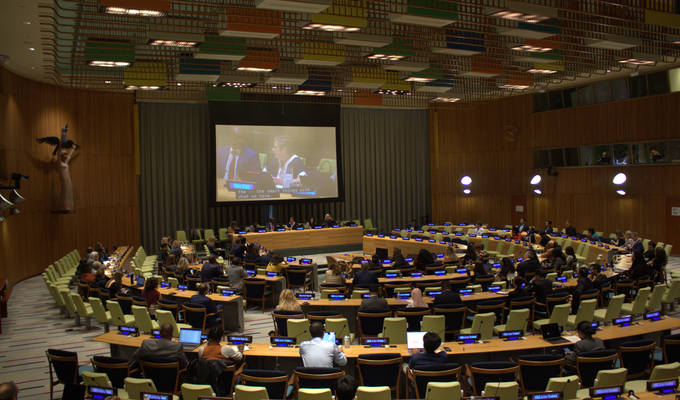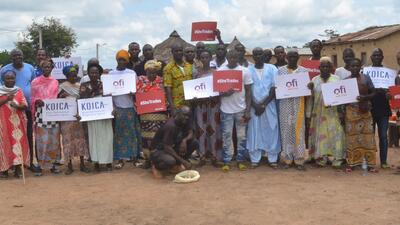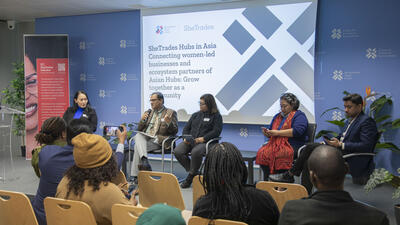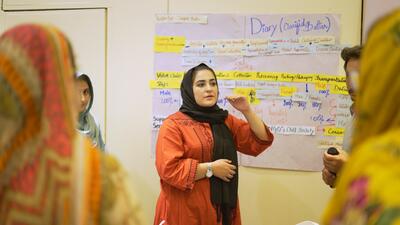

A call to action: Bridge the financial gap for small business! Here is how!
The International Trade Centre and UN Conference on Trade and Development joined hands for the SDG Action Weekend during the United Nations General Assembly 2023 and discussed financing opportunities for small and medium-sized enterprises.
The findings? Increase long-term supply-chain finance and build the digital infrastructure of small businesses with the help of smart policies and multinational corporations. Only then can we achieve the 2030 Agenda for sustainable development. See below 9 recommendations for action!
Even though small businesses are the backbone of our economies counting for more than two-thirds of employment worldwide, their financing gap is estimated at around $5 trillion.
Particularly women- and youth-led business face unique challenges – not only do they pay higher rates for lending, but they find it harder to access capital as they lack networks, collateral, or social norms.
At the SDG Action Weekend that took place on the margins of the United Nations General Assembly in September 2023 and which was convened by the UN Secretary-General to maximize impact, the International Trade Centre and UN Conference on Trade and Development (UNCTAD) led several discussions on the paradigms shifts, digital and financial solutions, partnerships and regulatory policies needed to empower small businesses and increase the financial inclusion of women and youth.
Access to long-term finance and digital technologies, supported by smart government policies and engaged multinational corporations, are needed to foster an ecosystem favorable to small and medium-sized enterprises (SMEs). What’s more, innovative collaborative approaches to de-risk financing, empowering and channeling finance to successful entrepreneurs can accelerate progress towards the Sustainable Development Goals (SDGs) laid out under the 2030 Agenda.
9 Recommendations for action
Be prepared to change the system! We are calling for greater collaboration and collective action in building platforms for market intelligence, designing digital tools and solutions to de-risk financing, and supporting businesses with potential, especially those led by women, youth and ecopreneurs – the climate pioneers that will bring us growth and sustainability.
- We call on Governments of the world to institute National Working Capital platforms to improve employment opportunities, and enable small, minority and woman-owned businesses to thrive, while contributing to GDP growth.
- We call on Governments to use existing levers and mechanisms to stimulate sustainable growth of this new generation of businesses by designing more strategic public procurement policies and ensuring development finance institutions do more to channel support to innovative small businesses with potential to grow and contribute to the SDGs.
- We call on corporates and public and private financial institutions including public development banks (PBDs) to scale long-term patient capital, adopt alternative credit scoring mechanisms for assessing and pricing risk and improve collection of gender- and age-disaggregated data and evidence to demonstrate why investing in inclusive SMEs makes business sense. We call for collaboration to develop and implement guarantee schemes and develop risk-sharing mechanisms and financial products that increase SME access to finance. Particular attention must be paid to designing programmes and interventions tailored to women and youth which address their very specific needs and challenges.
- We call on international leaders and standard setting bodies to make a unified commitment to adopt harmonized norms and regulations in global impact and sustainability accounting standards.
- We call on the impact measurement industry to provide SMEs with low/no-cost access and support so they can improve their measurement and ESG processes and build more bankable and impactful business offerings.
- We call on asset allocators to ensure transition financing is directed more intentionally towards SMEs that contribute to greening the economy. Investment and technical support enable SMEs to adapt to new compliance requirements, lower their emissions, report on their carbon output and positively contribute to biodiversity in global value chains – this will then generate outsized returns for the SDGs, and enable large corporates to report on and address scope 3 carbon emissions.
- We call on Chambers of Commerce and aggregators to take an active role in engaging with authorities, addressing trade restrictions, and lowering administrative and reporting burdens felt by SMEs.
- We call for greater investment in technology and digital payment platforms to increase the timeliness of payments and improve liquidity, reduce administrative and reporting complexity, simplify qualification requirements, and increase the transparency of these transactions.
- We call on business leaders to offer apprenticeships and training programmes to SMEs and young entrepreneurs, with a particular focus on making the business case for SDGs.
The issues at hand in more depth:
- With SMEs forming the backbone of our economies the SDGs cannot be achieved without their capacity building, financing, and greening.
- Liquidity and long-term patient finance at affordable rates is of paramount importance for the survival and growth of these firms. Yet, globally more than half of the requests made by SMEs for trade finance are rejected, compared to only 7% for multinational companies (Source WTO).
- Focus on the financial inclusion of women- and youth-led SMEs who face additional constraints that limit their access to finance and who pay higher rates for capital due to limited access to assets to pledge as collateral, and shorter credit history records and gender or youth-bias.
- Supply-chain finance (SCF) is a set of tech-based business and financing processes that lower costs and improve efficiency for the parties involved in a transaction. SCF can help SMEs navigate the dangers of unforeseen events, optimize their working capital, expand operations, and meet customer and market demand.
- Working capital will enable small businesses to participate in global value chains, needed for economic growth. Various tech platforms support collaboration across GVCs and increase the supply of working capital.
- Large corporate, governmental, and financial institutions including public development banks play a crucial role in implementing financial inclusion programmes and initiatives–ranging from alternative credit scoring mechanisms, collecting, and leveraging gender- and age-disaggregated data – to impact focused guarantee schemes for a risk-sharing mechanism. Finance also needs to be directed more intentionally towards innovative SMEs and social enterprises that are achieving socio-economic impact.













